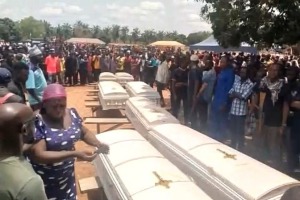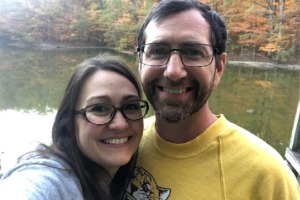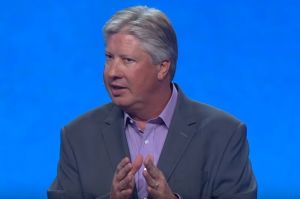Interview: Alpha USA Director on Pain, Getting Back to Basics of Jesus' Teachings
Gerard Long, executive director of Alpha USA, has experienced some painful tragedies in his personal life. But those trials have helped him gain a new perspective about eternity and the will of God. He spoke to The Christian Post recently while in Washington, D.C., about his personal journey as well as the popular Alpha Course, which he's been leading since 2006.
CP: Did you grow up in the church? What was your church experience like?
Gerard: I come from strong Christian family on both sides. They go back many generations. One side they go back to the Hugenots, who were persecuted Christians who came out of France, ended up in the U.K. Wonderful Christian parents who loved the Lord, Jesus. As a young boy, probably four or five years old, gave my heart to Jesus Christ. I remember very clearly with my sister asking Jesus to forgive me of my sins, to be my good shepherd. I went through strong Christian upbringing, church, Bible study, Christian camp.
But in my mid-teens, really my relationship with Jesus Christ was more head than heart. I went my own way, even though I never had any problem believing in the Lord. In my last year at college, through a letter from my brother who'd been into the drug scene, he wrote to me saying, Gerard I want you to know that God's got a plan for your life made out of perfect love. That was Feb. 13, 1980. The next day, sitting at my desk, no one else around, no music, it was like God just spoke to me and said Gerard, if you go my way you may not get the things on the outside but I'll give you quality of life on the inside. And I just surrendered my life to God on Valentine's Day 1980. It was a dramatic encounter because it was like God literally came into that room by the Holy Spirit and I started to weep, it was like his love was being poured into my life in the most amazing way.
Four things happened, dramatically changed in my life: One, I fell head over heels in love with Jesus Christ and just wanted to see his name glorified and people coming to know the real Jesus Christ, not religion. Two, I couldn't put the Bible down. Three, I had an overwhelming desire to tell other people about him. Four, I stopped swearing.
It was a total surrender of my life.
CP: You served as both a pastor and a bank executive (at HSBC)?
Gerard: Banking was my tentmaking. But I was very much invovled in local church which I ended up pastoring – a house church. For 17 years, I was a pastor. It was a wonderful church in central London. We used to meet in a school gymnasium for our Sunday gathering but the life of the church was in the homes through the week, 24/7; we were doing life together. Great model of church right in central London amongst the poor and the downtrodden. We saw tremendous amount of people come to the Lord. We started doing Alpha in 1995 in our home. We did it five years in a row, three times a year. We saw just amazing conversions in that period – drug addicts, alcoholics, street fighters, one communist guy from Czech Republic. Again and again before our eyes and this is pagan London. So we were sold on Alpha.
Then in the workplace we saw a mini revival taking place in early 90s in the city. Again, the heart being Matthew 6:33 seek first his kingdom and righteousness and everything else will follow. Our heart was I'm here not for career or money. I'm here to see your kingdom come. I believe our vocation is a calling and wherever God calls us then he's looking for us to live for his will and his kingdom. So we started a prayer in early 90s. We used to go early to work and pray for God's kingdom to come. In a very short space of time, we had six prayer meetings going on around the city in different buildings where Christians were coming together to pray, seek God's face, do Bible study, then we started doing outreach.
CP: When you say outreach, you shared the Gospel with the public?
Gerard: It was where I was working, reaching out to my colleagues, not preaching at them, I don't believe in Bible bashing but just being sensitive to where people are and sowing seeds – "hey I had a great time at church this Sunday" – and then seeing how people react to those seeds and inviting people to come to Alpha courses.
So you're doing your work but while you're doing it you're sensitive, looking for opportunities not only to witness to how you live but also to share the Gospel in a sensitive way which is Alpha's way.
CP: Was it easy for you to drop your banking career and pursue Alpha?
Gerard: The answer is yes because what happened is Lord sowed the seed in 2004. I always held my career lightly, God if you want me to do something else, I'm not here for money or career, I'm here for your will. If you want me to do something else, I'll do it. It was two years later, it came to germinate. It was just the right time. I'd been through … a period of real trial through that, which refined my purpose for living through brokenness.
I had to work through theologically all that period because it was a really tough time. It was like a Job (Old Testament figure) experience. It was like evil was released on our family. Someone close to me got [a blindness] out of the blue. Then my son ended up committing suicide through a drug … it was really nasty. Two months after that, my sister died of cancer. It was one thing after another. I was utterly broken at that time, weeping. Perhaps the biggest brokenness was when I was saying "Jesus, you're my best friend, what's going on here?" Two months after that, my wife nearly died of a broken heart. The doctor said she couldn't cope with all the stress so she got an internal hernia, had her intestines knotted. [They] cut out this hernia, right in the middle of her chest.
I had to work it out theologically. Lord, what is going on here? I had to reconcile that (I'll never forsake you) with what was going on. What I came to see, in the Psalms 199 it says before I was afflicted I went astray, now I've kept your decree and then he said later on, it was good that I was afflicted that I might learn your decrees. When we go through brokenness it's an opportunity to see things differently. What I came to see so clearly was eternity, that this life is very short. I know it's intense when we're here, but actually relative to eternity, it's very short.
Lots of Scripture talks about fix your eyes on things above, not on earthly things, set your mind on things above, build up yourselves treasures in heaven. Lots of Scripture points to the fact that we should have our eyes on the things above, not the things of this life. When you put things in that context, now you start seeing things that happen in this life in a different light because I believe what Jesus said, that whatever you're willing to give up here on earth you'll receive a hundred fold in this life and in the next, in eternity. I know Alex is in heaven, my son. He made a terrible mistake and thank God, through Jesus, he's been forgiven. I can see that our relationship will be that much greater through eternity because Jesus has asked us to go through this. Why? I believe in John 12 – it talks about a grain of wheat falling to the ground and dies. If it dies it brings forth much fruit. I can talk about the fact that … do a wakeup call and say, "guys, let's get real about why we're here." There's a purification that goes on through the brokenness.
The conclusion is the benefit for Jesus and for the kingdom of God outweighs the cost of what he's asked you to go through. So when Paul said I consider our current sufferings not worth comparing with the glory that shall be given I can accept it and actually … give thanks. What a privilege that you've enabled me, allowed me to go through this for your kingdom.
My wife isn't quite there yet. Part of our struggle over the last five years is the terrible pain and grief she's been [having]. We're going to write a book about that whole process. But we love each other more than ever now. She's slowly healing.
CP: So you're with Alpha USA now. When was it brought to the U.S.?
Gerard: Alpha started in 1997 in the USA. Its history is actually quite interesting. Initially it was a huge surge, new program on the block. It was new, it was exciting. But the church has never really grasped the DNA of Alpha. A lot of them saw it as a 101 discipleship class whereas really Alpha is aimed at those outside the church. Although it surged to start with, there wasn't a sustainability because they said all our congregants have been through it, let's move on to the next program, missing entirely the heart of Alpha – it's for those outside the church, those who are lost, heading to the wrong place of eternity. So it surged, then it dropped. In the last two years we've doubled in size. We expect 100,000 people to make commitments to Christ this year through Alpha across the country.
There are several reasons for it (new surge). One is prayer. We have 1,000 prayer warriors in Uganda who pray for us one hour a day. We have six national prayer cores every week. The structure is we have 51 regional teams around the country and they're encouraging churches to run Alpha but even more than that, to get a new vision for church because the church in the West is largely a come model whereas the model that Jesus gave was a go model. So we're encouraging churches to really have a fresh look at how they're doing church and mobilizing the saints. Hey c'mon guys, God's put you there first and foremost for his kingdom and his will.
So … it's starting to explode across the country now. People are getting it starting to understand it. Another exciting thing is Alpha is a great catalyst for unity. So we do an Alpha invitation, that's when churches in a community, city come together across all denominations – Protestants, Catholic, Orthodox - come together with a view of winning their city for Jesus Christ, and they start praying together.
CP: Catholics are involved as well?
Gerard: Yeah, it's fascinating. It's very easy for us to pigeonhole a denomination or groups of churches but no. it's a bit like Elijah who said I'm the only prophet here. God said no, I got others. It's Christ followers, people who love Jesus and following him and out of that we just want to make him known to the world
CP: Philip Yancey, the author, described the cultural landscape, or the church around the world using different stages of marriage. The church in Europe, he said, is in the divorce stage and the church in the U.S. is in the 25th anniversary stage. Do you see that as well?
Gerard: When I was in London, serving in the church, I saw tragedies, heartbreaking, churches closing becoming Buddhist temples, mosques, flats, theaters. Absolutely tragic. Now 50 percent of Europe is atheist. It's awful really when you see what's happened.
I come to America and I see the same signs. I heard last week there's going to be more foreclosures of churches this year than ever in the church history of America. Whereas in America it's still politically correct to go to church, in Europe it's the opposite – it's politically incorrect to go to church. You're odd if you go to church.
Here's the point: This can be reversed if the church will get back to Jesus' model, mission model, the Great Commission. If we go back to being a go model, what happens is something that happens in the heavenly realms – there's a clearing out of the spiritual blindness and this is a very exciting thing for the country actually. The Bible teaches that the battle is not on this level, it's up in the heavenly realms.The interesting thing is when Jesus gave us the model in Luke 9 and 10 (where he sends out 12 and then 72), the first thing he says to them as they modeled going, the first thing he said when they came back is "I saw Aatan fall like lightning from the heavenly realms. You are now the light of the world." What does light do to darkness? It drives it out. As they were going, something was happening up here. So the answer to the country is the church getting back to the Great Commission, to the going.
The church here is in a really tipping point; it can either go the way of Europe or there's just a little window to stop it.
CP: The Alpha Course addresses a lot of basic questions such as who is Jesus and why should I read the Bible. Is the church doing a bad job at answering those?
Gerard: The beauty of Alpha is it gets back to the core teachings of Jesus where everybody agrees, that's why you got unity around it. And when you boil it all down it comes back to God's plan – he just loves us so much, wants a relationship with us and wants thru us to reach the world. He said, now I want you to do what I've been doing. Why did he come? He came to seek out and save what was lost. He came to show us what God is like. So we're now called to do the same. Really the core of Christianity is very simple and what's so tragic is we make it so complex and religious that puts people off. We stop knowing how to just relate to people who are outside the church – our language gets very religious and we get judgmental and bigoted and look down on people.
So now you got a whole generation in the U.S., 16- to 29-year-olds, who have a negative view of Christians. Only 16 percent have a positive view of the church. If it's evangelical Christianity, only 3 percent have a positive view. That's a whole generation being lost unless we do something about it, which is where we get back to mission because young people want mission. They're saying "why go to church just to get all this knowledge, it's all about me, it becomes very selfish." What Jesus gave the young people, the disciples, was mission – go and win the world, help the down trodden, go and show them what I'm like, what the kingdom of God is like – that's what the young people can relate to. "I want to be involved in that; I want to see souls saved for eternity." It's very basic. This life is very short. Saving lives for eternity, how can you beat that?
C.S. Lewis made a fascinating quote. He said if you look through history, the Christians have had the most impact in the current world are those who had their eyes on the next. Since we've lost our eyes on heaven we've become ineffective here. Then he said "aim at heaven and you get earth thrown in; aim at earth and you get neither."
If we got that eternal perspective it frees us up from getting clogged down here; then we live life to the full, then we are effective for the kingdom of God. Then we have an impact here.
The other key element of Alpha, this is very important, is ... it follows the teachings of Jesus regarding the work of the Holy Spirit. We've lost the importance of being hungry for God and open to the work of the Holy Spirit in our lives and when you see Jesus' teaching he was very clear. I learned this in my own personal life trying to live on my own strength – pathetic. Then I was filled with the Holy Spirit in a dramatic way and now completely different way of living and now it's in the power and strength of the Holy Spirit.
One of the keys of Alpha's success is we keep a balanced but a very open clear view on the work of the Holy Spirit on our lives. He's the one who brings the life.
CP: Can you tell me about your new book, Breakthrough?
Gerard: The key objective is … it's a tool for Christians to use to be a trigger for those outside the church on one or more of the following items: One, out of reading this parable they start thinking there's more to life than what I'm seeing. Two, maybe there is a heaven and a hell. Three, maybe how I'm living my life is hurting other people. We can't live in a vacuum. How we live does impact other people.
We want Christians to give it to their unsaved non-Christian friends, families, colleagues. Then in reading it hopefully they'll say I want to investigate some more and that will lead them to come to Alpha Course.
We say to folks: "At the end of the day the claims of Christianity, the teachings of Jesus are profound, that there is a heaven and a hell. Just for the sake that this might be true, surely it's worth spending 10 weeks to investigate. You'd be a fool not to, just from pure logic. At the end you might think I've investigated, I'm OK as I am, I'll take my risk. We don't put pressure on people. But at least investigate.
Christianity is the only worldview that addresses these three questions – where we come from, why is it such a mess in the world and where are we going. We can give good sensible, logical, reasonable answers to those three questions.





























